An official website of the United States government
 United States Department of Labor
United States Department of Labor
Model garments or other apparel and accessories for prospective buyers at fashion shows, private showings, or retail establishments. May pose for photos to be used in magazines or advertisements. May pose as subject for paintings, sculptures, and other types of artistic expression.
Employment estimate and mean wage estimates for Models:
| Employment (1) | Employment RSE (3) |
Mean hourly wage |
Mean annual wage (2) |
Wage RSE (3) |
|---|---|---|---|---|
| 2,350 | 24.6 % | $ 25.99 | $ 54,050 | 15.6 % |
Percentile wage estimates for Models:
| Percentile | 10% | 25% | 50% (Median) |
75% | 90% |
|---|---|---|---|---|---|
| Hourly Wage | $ 12.00 | $ 12.33 | $ 15.34 | $ 23.43 | $ 59.97 |
| Annual Wage (2) | $ 24,970 | $ 25,660 | $ 31,910 | $ 48,730 | $ 124,730 |
Industries with the highest published employment and wages for Models are provided. For a list of all industries with employment in Models, see the Create Customized Tables function.
Industries with the highest levels of employment in Models:
| Industry | Employment (1) | Percent of industry employment | Hourly mean wage | Annual mean wage (2) |
|---|---|---|---|---|
| Colleges, Universities, and Professional Schools | 610 | 0.02 | $ 20.06 | $ 41,730 |
| Junior Colleges | 200 | 0.03 | $ 19.56 | $ 40,680 |
| Independent Artists, Writers, and Performers | 70 | 0.15 | $ 53.52 | $ 111,330 |
| Electronic Shopping and Mail-Order Houses | 70 | 0.02 | $ 17.49 | $ 36,370 |
| Other Professional, Scientific, and Technical Services | 30 | 0.00 | (8) | (8) |
Industries with the highest concentration of employment in Models:
| Industry | Employment (1) | Percent of industry employment | Hourly mean wage | Annual mean wage (2) |
|---|---|---|---|---|
| Independent Artists, Writers, and Performers | 70 | 0.15 | $ 53.52 | $ 111,330 |
| Junior Colleges | 200 | 0.03 | $ 19.56 | $ 40,680 |
| Electronic Shopping and Mail-Order Houses | 70 | 0.02 | $ 17.49 | $ 36,370 |
| Colleges, Universities, and Professional Schools | 610 | 0.02 | $ 20.06 | $ 41,730 |
| Other Professional, Scientific, and Technical Services | 30 | 0.00 | (8) | (8) |
Top paying industries for Models:
| Industry | Employment (1) | Percent of industry employment | Hourly mean wage | Annual mean wage (2) |
|---|---|---|---|---|
| Independent Artists, Writers, and Performers | 70 | 0.15 | $ 53.52 | $ 111,330 |
| Colleges, Universities, and Professional Schools | 610 | 0.02 | $ 20.06 | $ 41,730 |
| Junior Colleges | 200 | 0.03 | $ 19.56 | $ 40,680 |
| Electronic Shopping and Mail-Order Houses | 70 | 0.02 | $ 17.49 | $ 36,370 |
| Specialized Design Services | (8) | (8) | $ 14.52 | $ 30,210 |
States and areas with the highest published employment, location quotients, and wages for Models are provided. For a list of all areas with employment in Models, see the Create Customized Tables function.
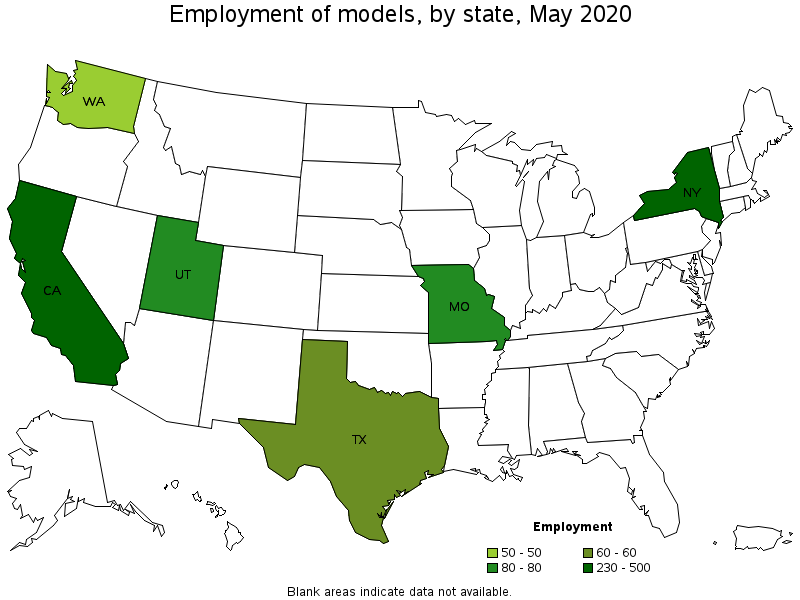
States with the highest employment level in Models:
| State | Employment (1) | Employment per thousand jobs | Location quotient (9) | Hourly mean wage | Annual mean wage (2) |
|---|---|---|---|---|---|
| California | 500 | 0.03 | 1.79 | (8) | (8) |
| New York | 230 | 0.03 | 1.58 | (8) | (8) |
| Utah | 80 | 0.05 | 3.25 | (8) | (8) |
| Missouri | 80 | 0.03 | 1.79 | (8) | (8) |
| Texas | 60 | 0.01 | 0.31 | $ 17.42 | $ 36,230 |
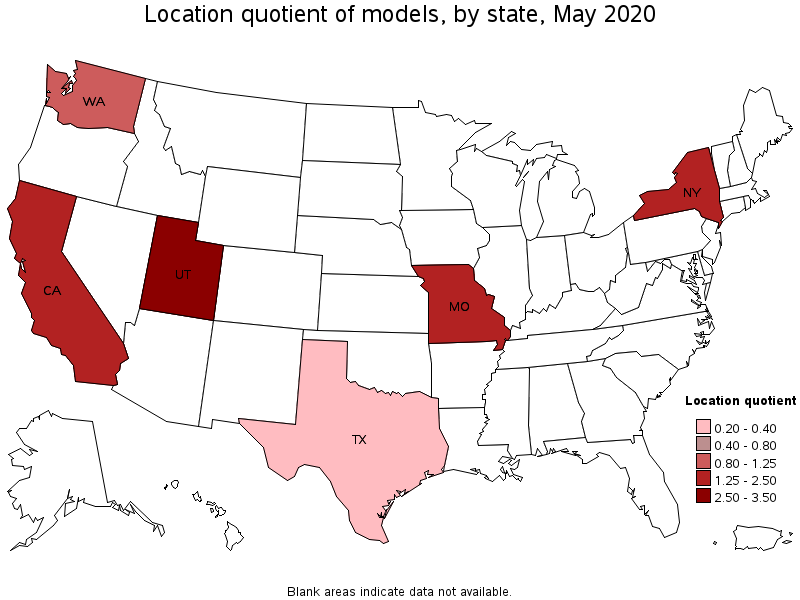
States with the highest concentration of jobs and location quotients in Models:
| State | Employment (1) | Employment per thousand jobs | Location quotient (9) | Hourly mean wage | Annual mean wage (2) |
|---|---|---|---|---|---|
| Utah | 80 | 0.05 | 3.25 | (8) | (8) |
| California | 500 | 0.03 | 1.79 | (8) | (8) |
| Missouri | 80 | 0.03 | 1.79 | (8) | (8) |
| New York | 230 | 0.03 | 1.58 | (8) | (8) |
| Washington | 50 | 0.02 | 0.97 | (8) | (8) |
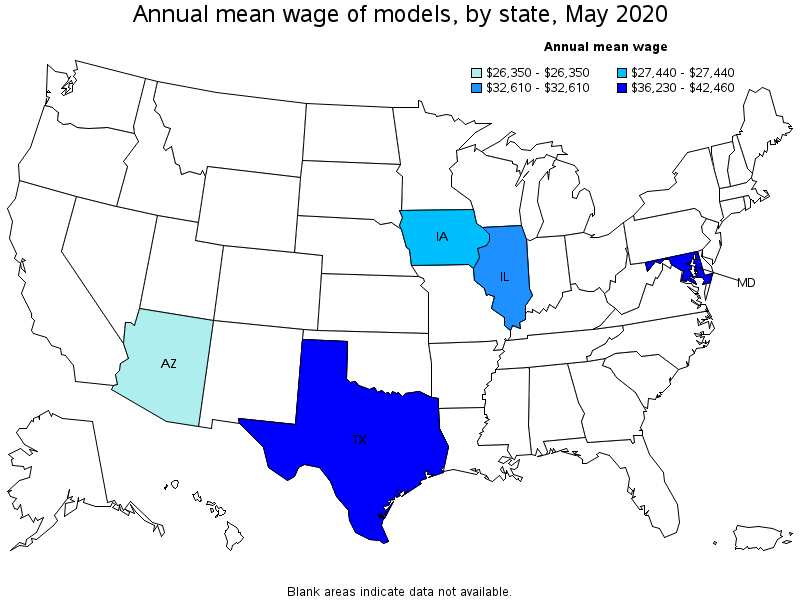
Top paying states for Models:
| State | Employment (1) | Employment per thousand jobs | Location quotient (9) | Hourly mean wage | Annual mean wage (2) |
|---|---|---|---|---|---|
| Maryland | (8) | (8) | (8) | $ 20.41 | $ 42,460 |
| Texas | 60 | 0.01 | 0.31 | $ 17.42 | $ 36,230 |
| Illinois | (8) | (8) | (8) | $ 15.68 | $ 32,610 |
| Iowa | (8) | (8) | (8) | $ 13.19 | $ 27,440 |
| Arizona | (8) | (8) | (8) | $ 12.67 | $ 26,350 |
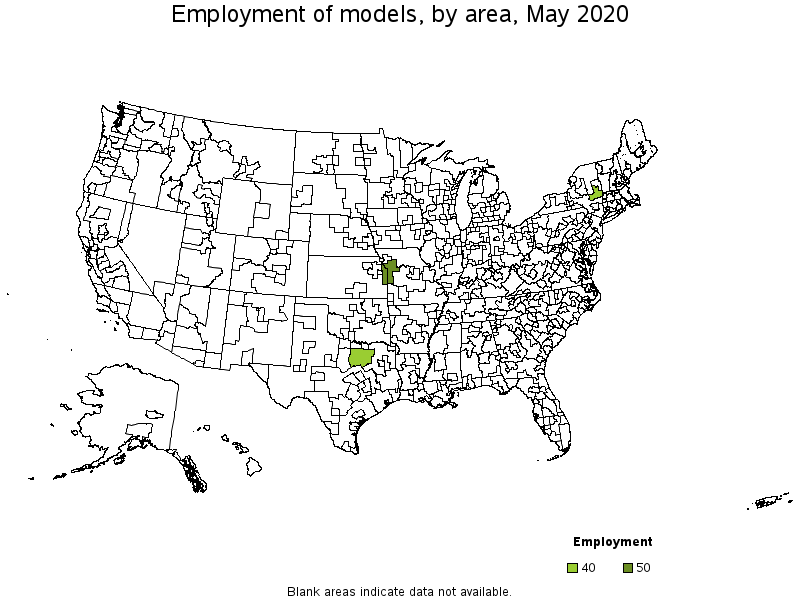
Metropolitan areas with the highest employment level in Models:
| Metropolitan area | Employment (1) | Employment per thousand jobs | Location quotient (9) | Hourly mean wage | Annual mean wage (2) |
|---|---|---|---|---|---|
| Kansas City, MO-KS | 50 | 0.05 | 3.06 | $ 21.87 | $ 45,500 |
| Dallas-Fort Worth-Arlington, TX | 40 | 0.01 | 0.69 | $ 19.98 | $ 41,550 |
| Albany-Schenectady-Troy, NY | 40 | 0.09 | 5.12 | $ 24.51 | $ 50,970 |
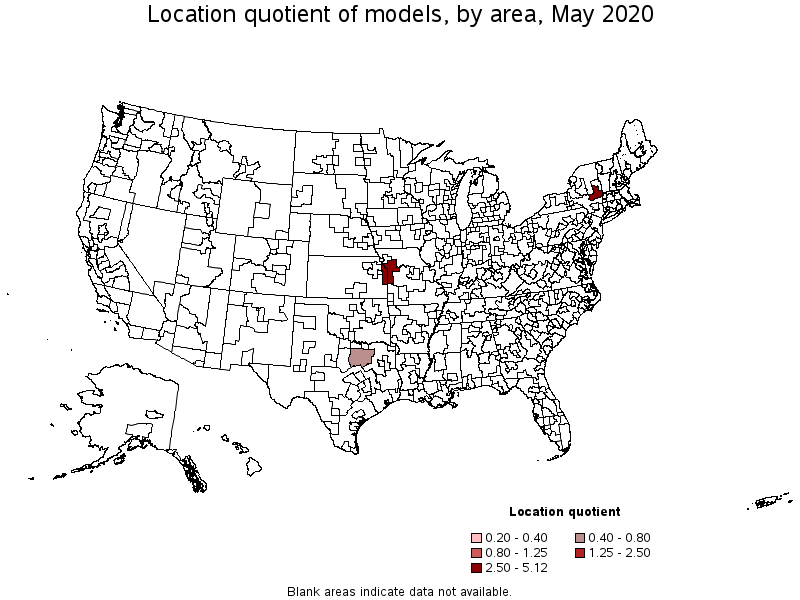
Metropolitan areas with the highest concentration of jobs and location quotients in Models:
| Metropolitan area | Employment (1) | Employment per thousand jobs | Location quotient (9) | Hourly mean wage | Annual mean wage (2) |
|---|---|---|---|---|---|
| Albany-Schenectady-Troy, NY | 40 | 0.09 | 5.12 | $ 24.51 | $ 50,970 |
| Kansas City, MO-KS | 50 | 0.05 | 3.06 | $ 21.87 | $ 45,500 |
| Dallas-Fort Worth-Arlington, TX | 40 | 0.01 | 0.69 | $ 19.98 | $ 41,550 |
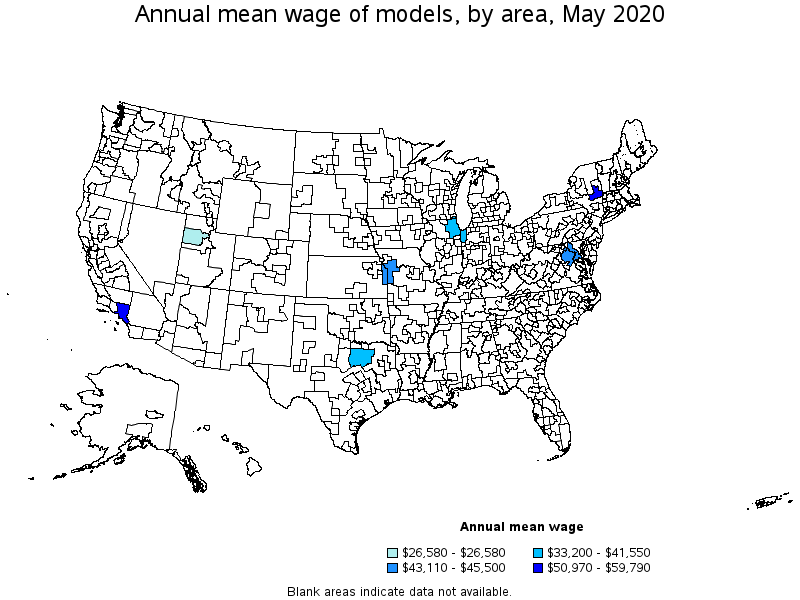
Top paying metropolitan areas for Models:
| Metropolitan area | Employment (1) | Employment per thousand jobs | Location quotient (9) | Hourly mean wage | Annual mean wage (2) |
|---|---|---|---|---|---|
| Los Angeles-Long Beach-Anaheim, CA | (8) | (8) | (8) | $ 28.75 | $ 59,790 |
| Albany-Schenectady-Troy, NY | 40 | 0.09 | 5.12 | $ 24.51 | $ 50,970 |
| Kansas City, MO-KS | 50 | 0.05 | 3.06 | $ 21.87 | $ 45,500 |
| Washington-Arlington-Alexandria, DC-VA-MD-WV | (8) | (8) | (8) | $ 20.73 | $ 43,110 |
| Dallas-Fort Worth-Arlington, TX | 40 | 0.01 | 0.69 | $ 19.98 | $ 41,550 |
| Chicago-Naperville-Elgin, IL-IN-WI | (8) | (8) | (8) | $ 15.96 | $ 33,200 |
| Salt Lake City, UT | (8) | (8) | (8) | $ 12.78 | $ 26,580 |
These estimates are calculated with data collected from employers in all industry sectors, all metropolitan and nonmetropolitan areas, and all states and the District of Columbia. The top employment and wage figures are provided above. The complete list is available in the downloadable XLS files.
The percentile wage estimate is the value of a wage below which a certain percent of workers fall. The median wage is the 50th percentile wage estimate—50 percent of workers earn less than the median and 50 percent of workers earn more than the median. More about percentile wages.
(1) Estimates for detailed occupations do not sum to the totals because the totals include occupations not shown separately. Estimates do not include self-employed workers.
(2) Annual wages have been calculated by multiplying the hourly mean wage by a "year-round, full-time" hours figure of 2,080 hours; for those occupations where there is not an hourly wage published, the annual wage has been directly calculated from the reported survey data.
(3) The relative standard error (RSE) is a measure of the reliability of a survey statistic. The smaller the relative standard error, the more precise the estimate.
(8) Estimate not released.
(9) The location quotient is the ratio of the area concentration of occupational employment to the national average concentration. A location quotient greater than one indicates the occupation has a higher share of employment than average, and a location quotient less than one indicates the occupation is less prevalent in the area than average.
Other OEWS estimates and related information:
May 2020 National Occupational Employment and Wage Estimates
May 2020 State Occupational Employment and Wage Estimates
May 2020 Metropolitan and Nonmetropolitan Area Occupational Employment and Wage Estimates
May 2020 National Industry-Specific Occupational Employment and Wage Estimates
Last Modified Date: March 31, 2021